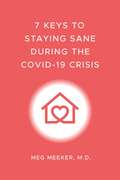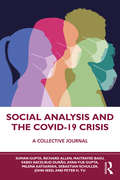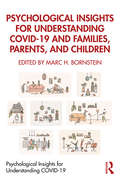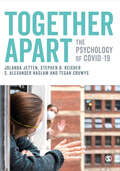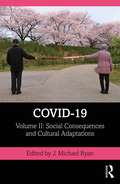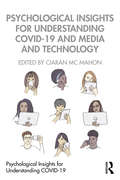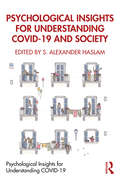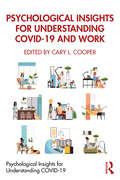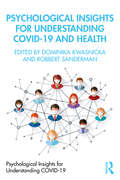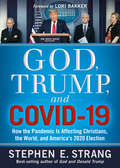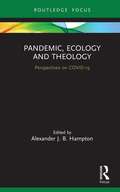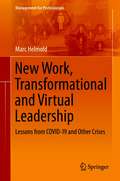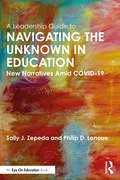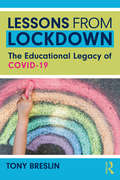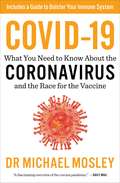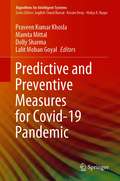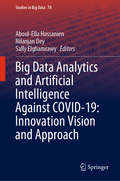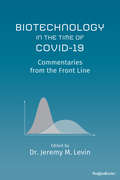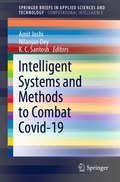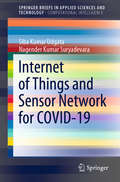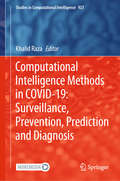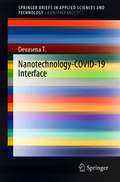Special Collections
Everything you ever wanted to know about the COVID-19 pandemic
- Table View
- List View
7 Keys to Staying Sane During the COVID-19 Crisis
by Meg MeekerMeg Meeker, M.D., America&’s family doctor, shares the seven keys to staying sane in the suddenly locked-down world of the coronavirus. Her new mini-ebook is your family&’s essential guide not just to surviving but to thriving, even as your world is turned upside down. Dr. Meeker prescribes practical steps that every family can take to handle the stress of close quarters, separation from friends, and unprecedented financial strain. Your family can even grow stronger as a result. Addressing the needs of the whole person, the physical need for a regular schedule and exercise, the emotional need for connection with others, the spiritual need for quiet prayer or meditation, Dr. Meeker sounds an encouraging call not to give in to the fear and chaos all around us.
Social Analysis and the COVID-19 Crisis
by Richard Allen and Suman Gupta and John Seed and Maitrayee Basu and Fabio Akcelrud Durão and Ayan-Yue Gupta and Milena Katsarska and Sebastian Schuller and Peter H. TuThis book is a collective journal of the COVID-19 pandemic. With first-hand accounts of the pandemic as it unfolded, it explores the social and the political through the lens of the outbreak. Featuring contributors located in India, the United States, Brazil, the United Kingdom, Germany, and Bulgaria, the book presents us with simultaneous multiple histories of our time. The volume documents the beginning of social distancing and lockdown measures adopted by countries around the world and analyses how these bore upon prevailing social conditions in specific locations. It presents the authors’ personal observations in a lucid conversational style as they reflect on themes such as the reorganization of political debates and issues, the experience of the marginalized, theodicy, government policy responses, and shifts into digital space under lockdown, all of these under an overarching narrative of the healthcare and economic crisis facing the world. A unique and engaging contribution, this book will be useful to students and researchers of sociology, public health, political economy, public policy, and comparative politics. It will also appeal to general readers interested in pandemic literature.
Psychological Insights for Understanding COVID-19 and Families, Parents, and Children
by Marc H. BornsteinWith specially commissioned introductions from international experts, the Psychological Insights for Understanding COVID-19 series draws together previously published chapters on key themes in psychological science that engage with people’s unprecedented experience of the pandemic. This volume collects chapters that address prominent issues and challenges presented by the SARS-CoV-2 pandemic to families, parents, and children. A new introduction from Marc H. Bornstein reviews how disasters are known to impact families, parents, and children and explores traditional and novel responsibilities of parents and their effects on child growth and development. It examines parenting at this time, detailing consequences for home life and economies that the pandemic has triggered; considers child discipline and abuse during the pandemic; and makes recommendations that will support families in terms of multilevel interventions at family, community, and national and international levels. The selected chapters elucidate key themes including children’s worry, stress and parenting, positive parenting programs, barriers which constrain population-level impact of prevention programs, and the importance of culturally adapting evidence-based family intervention programs. Featuring theory and research on key topics germane to the global pandemic, the Psychological Insights for Understanding COVID-19 series offers thought-provoking reading for professionals, students, academics, policy makers, and parents concerned with the psychological consequences of COVID-19 for individuals, families, and society.
Together Apart
by Jolanda Jetten and S. Alexander Haslam and Stephen D. Reicher and Tegan CruwysWritten by leading social psychologists with expertise in leadership, health and emergency behaviour – who have also played an important role in advising governments on COVID-19 – this book provides a broad but integrated analysis of the psychology of COVID-19It explores the response to COVID-19 through the lens of social identity theory, drawing from insights provided by four decades of research. Starting from the premise that an effective response to the pandemic depends upon people coming together and supporting each other as members of a common community, the book helps us to understand emerging processes related to social (dis)connectedness, collective behaviour and the societal effects of COVID-19. In this it shows how psychological theory can help us better understand, and respond to, the events shaping the world in 2020. Considering key topics such as:LeadershipCommunicationRisk perceptionSocial isolationMental healthInequalityMisinformationPrejudice and racismBehaviour changeSocial DisorderThis book offers the foundation on which future analysis, intervention and policy can be built.We are proud to support the research into Covid-19 and are delighted to offer the finalised eBook for free.All Royalties from this book will be donated to charity.
COVID-19
by J. Michael RyanThe SARS-CoV-2 virus, and the associated COVID-19 pandemic, is perhaps the greatest threat to life, and lifestyles, the world has known in more than a century. The scholarship included here provides critical insights into the institutional responses, communal consequences, cultural adaptations, and social politics that lie at the heart of this pandemic. This volume maps out the ways in which the pandemic has impacted (most often disproportionately) societies, the successes and failures of means used to combat the virus, and the considerations and future possibilities – both positive and negative – that lie ahead. While the pandemic has brought humanity together in some noteworthy ways, it has also laid bare many of the systemic inequalities that lie at the foundation of our global society. This volume is a significant step toward better understanding these impacts. The work presented here represents a remarkable diversity and quality of impassioned scholarship and is a timely and critical advance in knowledge related to the pandemic. This volume and its companion, COVID-19: Volume I: Global Pandemic, Societal Responses, Ideological Solutions, are the result of the collaboration of more than 50 of the leading social scientists from across five continents. The breadth and depth of the scholarship is matched only by the intellectual and global scope of the contributors themselves. The insights presented here have much to offer not just to an understanding of the ongoing world of COVID-19, but also to helping us (re-) build, and better shape, the world beyond.
Psychological Insights for Understanding COVID-19 and Media and Technology
by Ciarán Mc MahonIn the Psychological Insights for Understanding COVID-19 series, international experts introduce important themes in psychological science that engage with people’s unprecedented experience of the pandemic, drawing together chapters as they originally appeared before COVID-19 descended on the world. This book explores how COVID-19 has impacted our relationship with media and technology, and chapters examine a range of topics including fake news, social media, conspiracy theories, belonging, online emotional lives and relationship formation, and identity. It shows the benefits media and technology can have in relation to coping with crises and navigating challenging situations, whilst also examining the potential pitfalls that emerge due to our increasing reliance on them. In a world where the cyberpsychological space is constantly developing, this volume exposes the complexities surrounding the interaction of human psychology with media and technology, and reflects on what this might look like in the future. Featuring theory and research on key topics germane to the global pandemic, the Psychological Insights for Understanding COVID-19 series offers thought-provoking reading for professionals, students, academics and policy makers concerned with the psychological consequences of COVID-19 for individuals, families and society.
Psychological Insights for Understanding COVID-19 and Society
by S. Alexander HaslamIn the Psychological Insights for Understanding COVID-19 series, international experts introduce important themes in psychological science that engage with people’s unprecedented experience of the pandemic, drawing together chapters as they originally appeared before COVID-19 descended on the world. This book explores how COVID-19 has impacted society, and chapters examine a range of societal issues including leadership and politics, community, social status, welfare, social exclusion and accountability. Addressing the social and psychological processes that structure, and are structured by, our social contexts, it shows not only how groups and individuals can come together to manage global crises, but also how these crises can expose weaknesses in our society. The volume also reflects on how we can work together to rebuild society in the aftermath of the pandemic, by cultivating a shared sense of responsibility through social integration and responsible leadership. Showcasing theory and research on key topics germane to the global pandemic, the Psychological Insights for Understanding COVID-19 series offers thought-provoking reading for professionals, students, academics and policy makers concerned with the psychological consequences of COVID-19 for individuals, families and society.
Psychological Insights for Understanding COVID-19 and Work
by Cary L. CooperIn the Psychological Insights for Understanding COVID-19 series, international experts introduce important themes in psychological science that engage with people’s unprecedented experience of the pandemic, drawing together chapters as they originally appeared before COVID-19 descended on the world. This timely and accessible book brings together a selection of chapters offering insights into issues surrounding work and the COVID-19 pandemic. Featuring content on topics such as health and wellbeing, work-family, flexible hours, organisational communication, talent management, recovery from work, employee engagement and flourishing, burnout, and organisational interventions, the book includes a specially written introduction contextualising the chapters in relation to the COVID-19 crisis. Reflecting on how psychological research is relevant during a significant global event, the introduction examines the potential future impact of the pandemic on the practice and study of psychology and our lives more generally. Featuring theory and research on key topics germane to the global pandemic, the Psychological Insights for Understanding COVID-19 series offers thought-provoking reading for professionals, students, academics and policy makers concerned with the psychological consequences of COVID-19 for individuals, families and society.
Psychological Insights for Understanding Covid-19 and Health
by Dominika Kwasnicka; Robbert SandermanWith specially commissioned introductions from international experts, the Psychological Insights for Understanding COVID-19 series draws together previously published chapters on key themes in psychological science that engage with people’s unprecedented experience of the pandemic. In this volume on health, Dominika Kwasnicka and Robbert Sanderman introduce chapters that explore the crucial topics of health behaviour change, wellbeing, stress, and coping. They highlight the key role digital health technologies can play in how we manage health conditions, and how we facilitate change to help individuals manage stressful situations such as physical isolation, job loss, and financial strain during the COVID-19 pandemic. The volume also offers an important overview of environmental and policy-based approaches to health behaviour change and addresses the highly relevant issues of identity and trust and how they shape the health of individuals, communities, and society. Highlighting theory and research on these key topics germane to the global pandemic, the Psychological Insights for Understanding COVID-19 series offers thought-provoking reading for professionals, students, academics, and policymakers concerned with psychological consequences of COVID-19 for individuals, families, and society.
God, Trump, and COVID-19
by Stephen E. StrangFrom the best-selling author of God and Donald Trump, which was brandished by the president at the World Economic Forum in DavosHow the Pandemic Is Affecting Christians, the World, and America's 2020 Election This book is a timely follow up to God, Trump and the 2020 Election that reveals insider information about China, the virus, and the ever-increasing stakes of the upcoming election. It will answer the question for the Christian believers (and seekers) of where God is in all this? It provides a little known prophecy by the late David Wilkerson about a plague coming that would shut down the government as well as churches and bars, including shaking New York City as it&’s never been shaken. Wilkerson said this plague would force believers into radical prayer that will spark an awakening--something echoed by Christian leaders and prophets. Just as the economy was booming and Donald Trump was fixing long-term problems and beating back attacks from his opponents, a brand-new virus shakes up everything including the outcome of this election. The author has inside information about what happened in China early in the pandemic and what went wrong. He even documents how Donald Trump has led the nation in this time of crisis. In 2016, God raised up Donald Trump to lead America at a pivotal time. Evangelicals who recognized this backed him more than any other presidential candidate in history. Heading into Election Day 2020, the stakes are even higher, especially with the uncertainty and upheaval caused by COVID-19. This book is really &“part two&” of God, Trump and the 2020 Election which details the fight for the soul of America. Strang believes readers need both books to understand and explain what&’s at stake. With the shutdown caused by the pandemic, serious anti-Christian trends surfaced, such as some states closing &“non-essential&” churches but allowing liquor stores to provide curbside service. Or ceasing all elective surgeries except abortion, which is the taking of a life while the purpose in shutting down the economy was to save lives from this dreaded virus.Other Books Available:God, Trump, and the 2020 Election ISBN: 9781629996653 (2020)Trump Aftershock ISBN: 9781629995557 (2018)God and Donald Trump ISBN: 9781629994864 (2017)
Pandemic, Ecology and Theology
by Alexander J. B. HamptonAs the sequential stages of the 2020 COVID-19 pandemic have unfolded, so have its complexities. What initially presented as a health emergency, has revealed itself to be a phenomenon of many facets. It has demonstrated human creativity, the oft neglected presence of nature, and the resilience of communities. Equally, it has exposed deep social inequities, conceptual inadequacies, and structural deficiencies about the way we organize our civilization and our knowledge. As the situation continues to advance, the question is whether the crisis will be grasped as an opportunity to address the deep structural, ecological and social challenges that we brought with us into the second decade of the new millennium. This volume addresses the collective sense that the pandemic is more than a problem to manage our way out of. Rather, it is a moment to consider our broken relationship with the natural world, and our alienation from a deeper sense of purpose and meaning. The contributors, though differing in their diagnoses and recommendations, share the belief that this moment, with its transformative possibility, not be forfeit. Equally, they share the conviction that the chief ground of any such reorientation ineluctably involves our collective engagement with both ecology and theology.
New Work, Transformational and Virtual Leadership
by Marc HelmoldThe increasing globalization, the battle for talents, and global trends are changing the work patterns in organisations around the globe. Enterprises are working across country and cultural borders alongside complex supply and demand networks. Global incidents such as the financial crisis in 2008 and the recent COVID-19 pandemic have forced global organizations to find innovative ways to continue to connect globally and maintain a competitive advantage. Therefore, innovative enterprises have established global and virtual organisations including members of the value chain on supply and demand side. This book outlines these new work and leadership styles, and agile organisations, which are necessary to work virtually and globally. It provides case studies and experiences from different global organizations in different industries and sectors with a focus on value-adding processes and services.
Reopening K-12 Schools During the COVID-19 Pandemic
by Board on Children, Youth, and Families and Division of Behavioral and Social Sciences and Education and Board on Science Education and National Academies of Sciences, Engineering, and Medicine and Standing Committee on Emerging Infectious Diseases and 21st Century Health Threats and Committee on Guidance for K-12 Education on Responding to COVID-19The COVID-19 pandemic has presented unprecedented challenges to the nation's K-12 education system. The rush to slow the spread of the virus led to closures of schools across the country, with little time to ensure continuity of instruction or to create a framework for deciding when and how to reopen schools. States, districts, and schools are now grappling with the complex and high-stakes questions of whether to reopen school buildings and how to operate them safely if they do reopen. These decisions need to be informed by the most up-to-date evidence about the SARS-CoV-2 virus that causes COVID-19; about the impacts of school closures on students and families; and about the complexities of operating school buildings as the pandemic persists. Reopening K-12 Schools During the COVID-19 Pandemic: Prioritizing Health, Equity, and Communities provides guidance on the reopening and operation of elementary and secondary schools for the 2020-2021 school year. The recommendations of this report are designed to help districts and schools successfully navigate the complex decisions around reopening school buildings, keeping them open, and operating them safely.
A Leadership Guide to Navigating the Unknown in Education
by Sally J. Zepeda and Philip D. LanoueRecognizing that education systems have been temporarily paralyzed in the past and likely will in the future—whether it’s because of a natural disaster or a pandemic—this important volume offers critical insights about how schools can effectively carry forward the mission of educating all children even in the face of system turbulence and disruption. Featuring Narratives from expert leaders in urban, rural, and suburban school systems, this book explores important questions about the "new normal" such as the ways in which students can and should learn, how educators can teach and lead effectively, and how schools can carry out important functions beyond their instructional mission. Chapters present inspiring stories of leaders and teachers who have rallied, rebuilt, and problem-solved in face of the pandemic and amid adversity, ultimately providing a roadmap for how it’s possible to rebuild and adjust while preserving the fundamental core of education. Full of takeaways and first-hand insights into how systems and their schools faced turbulence, disruption, and adaptation, this book is a must-read for today’s educators committed to making a positive impact on the students they have the duty to serve.
Lessons from Lockdown
by Tony BreslinLessons from Lockdown explores the impact of COVID-19 on our schooling systems, on the young people and families that they serve and on all who work in – and with – our schools, and asks what the long-term ramifications of the pandemic might be for the pedagogy and purpose of formal education. Drawing on the voices of more than a hundred pupils, parents and professionals, it reveals how teachers and learners are adapting practice in areas such as curriculum modelling, parental engagement, assessment and evaluation and blended and online learning. In this timely new book, Tony Breslin draws on his experience as a teacher, researcher, examiner, school governor and policy influencer to assess what the educational legacy of COVID-19 could be, and the potential that it offers for reframing how we ‘do’ schooling. Whatever your place in this landscape, Lessons from Lockdown is a must-read for all concerned about the shape and purpose of schooling systems in mature economies – schooling systems and economies set on recovering from the kind of ‘system shock’ that the pandemic has delivered.
Migros Turkey: Scaling Online Operations During COVID-19 (C)
by Gamze Yucaoglu and Antonio MorenoThe case opens in August 2020 as Ozgur Tort and Mustafa Bartin, CEO and chief large-format and online retail officer of Migros Ticaret A.S. (Migros), Turkey's oldest and one of its largest supermarket chains, are navigating Migros through COVID-19 and the unprecedented surge in demand in online groceries. Between the first official case in Turkey in March and August, customers have flocked to online shopping and Migros' teams have been busy trying to solve the picking, fulfillment, and logistics bottlenecks. In the six months, the company recruited and trained new pickers, expanded its delivery fleet, and converted less busy stores into dark stores. Quick to react, Migros was able to add new customers to its base and was proud of its accomplishments. Now, unable to forecast how much of the surge in demand for online was here to stay, how should Migros plan for the future of Sanal Market and Hemen? Was there anything the company could do to sustain the number of hybrid shoppers it acquired during the past few months?
COVID-19
by Dr Michael MosleyDiscover the most essential and comprehensive information about the coronavirus (COVID-19) pandemic, how to ward off infection, and safeguard your mental and physical health during isolation—from the award-winning science journalist and #1 New York Times bestselling author of The Fast 800 and The FastDiet.Dr. Michael Mosley has experienced the effects of coronavirus firsthand, as he and both his sons—medical professionals in their twenties—all became ill during the height of the pandemic in London. Now recovered, Dr. Mosley shares his insights and explains the science behind the greatest public health crisis of our time. From the emergence of the novel virus in China at the end of 2019 to its rapid worldwide spread, this clear, detailed guide provides you with a basic understanding of the virus, how it jumps from person to person, how it can be overcome, and the most effective ways to protect yourself and your family. Featuring in-depth interviews with leading doctors and virus researchers working on the front lines to defeat this microscopic enemy, COVID-19 also tracks the ongoing developments in finding new treatments and an effective vaccine—the only way to ultimately halt the spread of the virus. Offering highly readable, easy-to-digest information about this global pandemic, Dr. Mosley&’s COVID-19 is the ultimate resource to help you feel better informed and take care of yourself as we all work through this global crisis.
Predictive and Preventive Measures for Covid-19 Pandemic
by Mamta Mittal and Lalit Mohan Goyal and Praveen Kumar Khosla and Dolly SharmaThis book explores the inputs with regard to individuals and companies who have developed technologies and innovative solutions, bioinformatics, datasets, apps for diagnosis, etc., that can be leveraged for strengthening the fight against coronavirus. It focuses on technology solutions to stop Covid-19 outbreak and mitigate the risk. The book contains innovative ideas from active researchers who are presently working to find solutions, and they give insights to other researchers to explore the innovative methods and predictive modeling techniques. The novel applications and techniques of established technologies like artificial intelligence (AI), Internet of things (IoT), big data, computer vision and machine learning are discussed to fight the spread of this disease, Covid-19. This pandemic has triggered an unprecedented demand for digital health technology solutions and unleashing information technology to win over this pandemic.
Big Data Analytics and Artificial Intelligence Against COVID-19: Innovation Vision and Approach
by Aboul-Ella Hassanien and Nilanjan Dey and Sally ElghamrawyThis book includes research articles and expository papers on the applications of artificial intelligence and big data analytics to battle the pandemic. In the context of COVID-19, this book focuses on how big data analytic and artificial intelligence help fight COVID-19. The book is divided into four parts. The first part discusses the forecasting and visualization of the COVID-19 data. The second part describes applications of artificial intelligence in the COVID-19 diagnosis of chest X-Ray imaging. The third part discusses the insights of artificial intelligence to stop spread of COVID-19, while the last part presents deep learning and big data analytics which help fight the COVID-19.
Data Privacy During Pandemics
by Ricardo Sanchez and Benjamin Boudreaux and Matthew A. DeNardo and Sarah W. Denton and Katie Feistel and Hardika DayalaniAs part of the response to the COVID-19 pandemic, governments worldwide have deployed mobile phone surveillance programs to augment public health interventions. However, these programs raise privacy concerns. The authors of this report examine whether two goals can be achieved concurrently: the use of mobile phones as public health surveillance tools to help manage COVID‑19 and future crises, and the protection of privacy and civil liberties.
Biotechnology in the Time of COVID-19
by Dr Jeremy M. Levin47 leaders from across the biotechnology industry tell their stories of battling the global scourge of COVID-19. Pandemics have killed at least a half billion people over the past two millennia. But in the age of biotechnology, humanity is no longer defenseless. The biotechnology industry is a diverse community of scientists, doctors, patients, entrepreneurs, investors, bankers, analysts and reporters, all committed to treating and curing disease. Over the past forty years, it has produced medical advances at an electrifying rate. As the COVID-19 pandemic emerged, hundreds of companies quickly pivoted to combating the virus. The contributors to this book offer inside views of this seminal industry, with historical and personal perspectives, lessons learned, and looks into the future. Diverse as these leaders are, they are united by their conviction that science and medicine will light humanity&’s way to greater health and longevity.
Intelligent Systems and Methods to Combat Covid-19
by Nilanjan Dey and Amit Joshi and K. C. SantoshThis book discusses intelligent systems and methods to prevent further spread of COVID-19, including artificial intelligence, machine learning, computer vision, signal processing, pattern recognition, and robotics. It not only explores detection/screening of COVID-19 positive cases using one type of data, such as radiological imaging data, but also examines how data analytics-based tools can help predict/project future pandemics. In addition, it highlights various challenges and opportunities, like social distancing, and addresses issues such as data collection, privacy, and security, which affect the robustness of AI-driven tools. Also investigating data-analytics-based tools for projections using time series data, pattern analysis tools for unusual pattern discovery (anomaly detection) in image data, as well as AI-enabled robotics and its possible uses, the book will appeal to a broad readership, including academics, researchers and industry professionals.
Internet of Things and Sensor Network for COVID-19
by Nagender Kumar Suryadevara and Siba Kumar UdgataThis book examines various models/solutions in areas, such as individuals, home, work and society, where IoT and AI are being utilized to mitigate the Covid-19 pandemic. The world is battling with the novel coronavirus, and government authorities, scientists, medical practitioners, and medical services are striving hard to help people to face the challenges. During this crisis, numerous innovative ideas and solutions have been proposed for using the Internet of things (IoT), sensor networks, and artificial intelligence (AI) to monitor the wellbeing of individuals. Nations are using all available assets to help develop cutting-edge innovations to relieve the impacts of Covid-19 and profile individuals in danger. The advances in IoT frameworks and sensor technologies together with AI are invaluable in the context of this pandemic, and nations and various entities around the globe are discovering innovative solutions to maintain businesses and help people live alongside Covid-19. This book presents the advances in sensor technologies, IoT frameworks, and explores how these technologies are being used to deal with the issues arising from Covid-19, including work in progress and potential applications.
Computational Intelligence Methods in COVID-19: Surveillance, Prevention, Prediction and Diagnosis
by Khalid RazaThe novel coronavirus disease 2019 (COVID-19) pandemic has posed a major threat to human life and health. This book is beneficial for interdisciplinary students, researchers, and professionals to understand COVID-19 and how computational intelligence can be used for the purpose of surveillance, control, prevention, prediction, diagnosis, and potential treatment of the disease. The book contains different aspects of COVID-19 that includes fundamental knowledge, epidemic forecast models, surveillance and tracking systems, IoT- and IoMT-based integrated systems for COVID-19, social network analysis systems for COVID-19, radiological images (CT, X-ray) based diagnosis system, and computational intelligence and in silico drug design and drug repurposing methods against COVID-19 patients. The contributing authors of this volume are experts in their fields and they are from various reputed universities and institutions across the world. This volume is a valuable and comprehensive resource for computer and data scientists, epidemiologists, radiologists, doctors, clinicians, pharmaceutical professionals, along with graduate and research students of interdisciplinary and multidisciplinary sciences.
Nanotechnology-COVID-19 Interface
by Devasena T.This book highlights the role of nanotechnology concepts in the management of COVID-19 pandemic. The book covers different aspects of the causative agent SARS CoV2 (Severe Acute Respiratory Syndrome Coronavirus-2) and the COVID-19 pandemic with a special emphasis on nanotechnology. It discusses the origin and history of SARS CoV2 and the outbreak of COVID-19 and highlights the geographical mutations in the SARS CoV2 virus genome, providing information about the structural features, antigenicity and the life cycle of SARS CoV2. The book provides an insight into nanotechnology–virology interface and explains how nanomaterials link the gap between the vital phases of SARS CoV2 life cycle and the four modalities of COVID-19 management viz sensing/diagnosis, therapy, prevention and self-protection. Further, the existing and promising diagnostic tools for detection of COVID-19 are discussed with an emphasis on nano PCR, nanoimmunosensors, biobarcode assay and point of care approach and also describe the nanoparticles involved in the CT imaging of lungs and SFHI (Spatial Frequency Hetrodyne Imaging) for diagnosis of SARS COV2 infection. The book concludes with details about translational medicine and explains the types of SARS CoV2 vaccines, stages of COVID-19 vaccine development and possible nanovaccines for COVID-19, followed by the description on biopharmaceutical companies involved in the production of SARS CoV2 vaccines.
